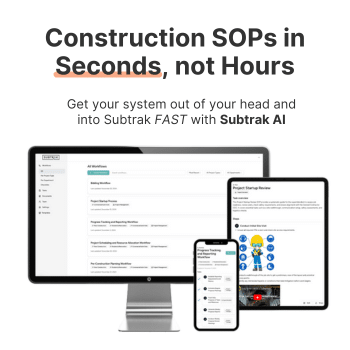Estimate Review for Flooring
The Estimate Review workflow helps flooring contractors ensure bid accuracy and consistency. It includes reviewing square footage, material pricing, labor estimates, subcontractor quotes, and compliance requirements. Managers reconcile figures with budgets and confirm profit goals. By standardizing this process, flooring companies reduce errors, protect profitability, and improve efficiency. Clients benefit from confidence in detailed, transparent proposals. Teams gain accountability with documented reviews. With this workflow in place, flooring contractors can strengthen professionalism, improve efficiency, and deliver projects more reliably while boosting competitiveness in the estimating process.
Schedule a review meeting with estimator, project manager, and/or leadership
Pull up the complete estimate, including takeoff, supplier/sub quotes, and assumptions
Verify scope coverage against plans, specs, and client requirements
Double-check quantities, unit costs, labor rates, and equipment pricing
Confirm all subcontractor and supplier quotes are current and complete
Review applied markups for overhead, profit, and contingency
Evaluate project risks (timeline, logistics, manpower, unknowns)
Discuss alternate approaches or value engineering opportunities
Confirm schedule alignment and resource availability
Review alignment with company goals (fit, workload, client relationship)
Make any necessary corrections or updates to the estimate
Finalize and approve the estimate for proposal creation or bid submission
Save reviewed estimate in job folder and update bid tracking log
👈 Use this SOP template inside Subtrak
Edit with AI. Customize in seconds. Store and share all your SOPs and checklists in one place.
